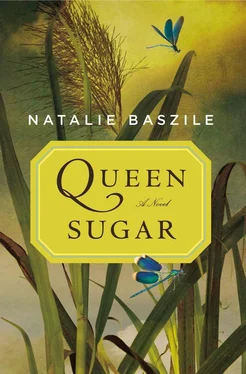Dressed in waist-high waders and flanked by crates of rotting trash fish, Ralph Angel sat on the German’s tailgate, trying to convince himself there was nothing wrong with pulling traps for $7.25 an hour.
The night of the hurricane, he took the last of Gwenna’s check and headed over to Tee Coteau, where he asked around in the seedy bars and dark parking lots until he found what he was looking for. Then, drunk and stoned, he rode out the storm and a few days after in an abandoned house. But when Ralph Angel came to, sobered up, he found that he was plagued by the same dark thoughts as before: how he’d made a fool of himself at the bakery ( Go , Johnny had said, bending to pick up all the ruined loaves. Don’t worry about it. Please, just go ); how Charley accused him of pushing ’Da on purpose (’Da shouldn’t have gotten in his face like that; why wasn’t anyone talking about that?), stealing his father’s money (How could he steal what should have been his?), that he was jealous of Hollywood (You call that a business? Any idiot could mow a lawn.).
All told, Ralph Angel stayed gone five days. Blue refused to speak to him when he reappeared; pouted and turned his back every time Ralph Angel called him. That had been the worst part; he’d never left Blue behind like that before, but sometimes a man had to step away for a while. Blue only came around when Ralph Angel offered to read him another Bible story, and even that didn’t ease Blue’s fears entirely. He followed Ralph Angel around like a duckling, cried when Ralph Angel said he still had to go to school.
As for the rest of the family, coming home was easier than he expected. Charley ignored him, and ’Da was so happy to see him she smothered him with all her hovering and coddling until he told her to give him some space. She apologized and left him alone after that, which was good, because he’d come up with a plan.
While everyone was at church, he took the newspaper to his room, spread the want ads on his bed, and circled jobs he thought he was cut out for. After Blue went to sleep, he found Miss Honey’s old Underwood and pecked out a cover letter, filling in the missing keystrokes with a leaky black ballpoint.
T oWh om It M ay Concern,
I am writing t oinquire about the p ositi on listed in Sund ay’s p aper. I attended S outhern University where I studied Civil Engineering. I h ave extensive s ales experience resulting fr om my ye ars with R ancher’s Pride Me at Dire ct and the Ph oenix W ater Services Dep artment… I am flexible ab out the s al ary and benefits. I would welcome ach ance t odiscuss my qu alific ati ons further and expl ain the g aps in my empl oyment.
Y ours truly,
Each afternoon, he walked down to the post office, imagining that he would see, there among the bills and circulars in ’Da’s box, a letter inviting him for an interview. One day, a thin envelope arrived.
Dear Sir,
Thank you for your interest in our sales position. At this time, we have decided your work experience does not coincide with the job requirements. Good luck in your continued search.
Sincerely,
Ralph Angel jammed the letter in his sweat suit pocket and walked across the street to the gas station, where he bought three Snickers and a king-size Baby Ruth before boosting a Schlitz forty-ouncer from the display near the door.
In the next round, he answered ads for home health care aids, security guards, dishwashers at the Waffle House where he worked the summer before he went to college. But no luck. Finally, he signed up with the job-training center in Lafayette, where the clerk looked at him as though he were a recent parolee and told him to take a seat until she called his name. Two hours later, he had the name of a crawfish farmer and a number to call. Which was how he wound up sitting on the German’s tailgate next to a crate of rotting fish.
• • •
“You there,” the German said, pointing. He was a large man with arms sunburned terra-cotta and fingers thick as sausages. “You ever pull traps?”
“I’m an engineer,” Ralph Angel said. “Went to Southern.” He wondered if the German had even graduated from high school and guessed he probably inherited this place from his father, who inherited it from his father, since that was the way luck worked down here.
The German squinted. “Well, then you’re smart enough to know I can’t pay you unless you put in a day’s work. This ain’t no beauty contest. Get off your ass and start hauling bait.”
“I don’t know what the agency told you,” Ralph Angel said, sliding off the tailgate. “But I’ve got management experience.”
The German held Ralph Angel in his gaze. “I don’t care if you won the fucking Nobel Prize. I need a man to pull those traps. Can you do the job or not?”
• • •
The first two crawfish ponds bordered a strip of raised ground where the pickup was parked. Fringed with willows overhanging the soggy banks, each pond measured forty acres and looked bottomless beneath the willows’ reflection. Twenty more man-made ponds just like this one were scattered through the woods.
A burlap tarp concealed the bait crates. Ralph Angel peeled it away and forced himself to look at the hollowed eyes, the gaping mouths, the maggots inching their way through the bloody gills. His stomach rolled as he hoisted two crates into his arms.
Down at the dock, two young men — one black, one white — stood by an aluminum bateau beached in the cattails along the bank. Ralph Angel eyed the bateau warily, and couldn’t help but wonder how quickly he’d drown if it capsized. The black boy — chinstrap beard, wave cap over his cornrows — jammed his fists in his pocket and spat into the water while the white boy, in a guts-smeared T-shirt, baseball cap set sideways like a music video gangster, scratched his belly and exchanged a knowing glance with the black kid as Ralph Angel set the crates on the dock.
“’Sup?” said the white kid.
Ralph Angel had been around long enough to know how he had to play this. You couldn’t come off as too aggressive with guys like this, since you were on their turf; but you couldn’t come off as a pussy either. “Nothing, man.”
“The boss is a hard-ass,” said the white kid, “but he’s a’ight. Don’t ride us too hard long as we be filling sacks. Yo, it ain’t personal, know what I’m sayin’?”
Ralph Angel nodded. Why did white kids think it was cool to talk like black kids from the ’hood? “Yeah, okay,” he said.
The black kid carried the crates to the bateau, where he stacked them neatly, as if it mattered.
“I’m Jason,” the white kid said. “That’s Antoine.” Antoine ignored them; someone, apparently, had to load the bateau. Jason kicked at the marshy ground; his rubber boots made a sucking sound in the mud. “This your first time?”
“Yeah,” Ralph Angel said. “You know how it is, man. Got to make a little paper.”
Читать дальше












